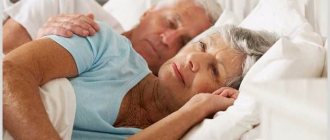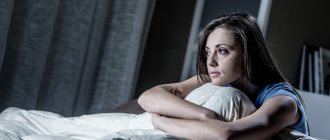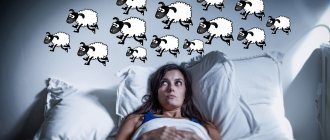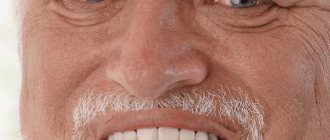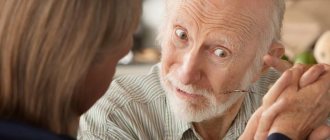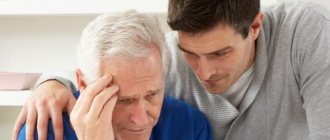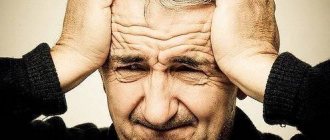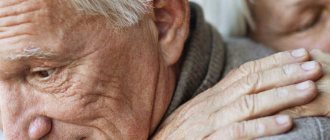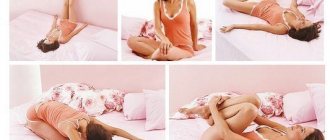Sleep is essential for people of all ages, and getting enough sleep is especially important as you get older.
During sleep, the immune system is restored, blood pressure is normalized, and accumulated information is processed.
In adulthood, sleep disorders often occur. Therefore, it is for older people that remedies for insomnia are of great importance.
Causes of insomnia in the elderly
As the body ages, changes occur in its central nervous system under the influence of a number of chemical reactions. The number of inhibitory neurons decreases, which disrupts the process of sleep onset. This is aggravated by a decrease in the activity of other nerve cells with similar properties, and a slowdown in the production of the hormone melatonin.
In some cases, the blackout does not reach the required depth, which leads to frequent awakenings.
It is also not uncommon for nighttime sleep to completely disappear.
Insomnia in the elderly may be the result of the following factors:
- dysfunction of the thyroid and/or pancreas;
- acute shock, chronic stress;
- non-compliance with the daily routine, ignoring the rules of healthy eating;
- somatic diseases - especially problems with the heart, liver, kidneys, respiratory system and gastrointestinal tract;
- refusal of age-appropriate physical activity;
- mental and neurological disorders in the form of senile dementia, depression, psychoses, neuroses;
- being overweight;
- lack of social activity, lack of communication, isolation from society;
- pain in joints, back, muscles;
- sleep apnea and snoring;
- late manifestations of menopause in women;
- taking medications - drowsiness or insomnia in the elderly is caused by eye drops, diabetes medications, antihypertensive and cardiac medications, and much more.
Pancreatic dysfunction can cause problems falling asleep.
Elderly people like to see doctors, but rarely follow their instructions. Most often, they try to solve their problems on their own, based on advertising, their own experience, and rumors. Elderly patients are reluctant to make changes to their usual lifestyle, preferring to take medications. Experiments with sedative and hypnotic products after 60 years of age often cause premature death in such patients.
Alcohol compatible list
There is almost always incompatibility between the strongest sleeping pills and ethyl alcohol. Combining alcohol with sleep medications can be dangerous to human health and life.
Ethyl alcohol increases the toxicity of barbiturates, enhances their effect, reduces the adequate response and leads to increased depression of the central nervous system.
In people with respiratory failure, the combined use of ethyl alcohol and barbiturates can lead to depression of the respiratory center.
In people with alcohol dependence, treatment with barbiturates leads to rapid drug dependence.
Only under the supervision of a physician are benzodiazepine drugs prescribed for alcohol withdrawal as a sedative. Medications make the detoxification process easier.
The combination of benzodiazepines and alcoholic beverages leads to severe intoxication. In humans, the functions of the central nervous system are disrupted, the respiratory center is depressed.
If you do not wake up the victim and provide first aid, he may die from respiratory arrest.
Ethyl alcohol reduces the sedative effect of antihistamines and increases the risk of side effects. In this case, a person cannot fall asleep due to increased heart rate, anxiety, and dry mouth.
In order for sleep to occur, the patient has to increase the dosage. Ultimately, this leads to drug addiction.
Ethyl alcohol can neutralize the effect of melatonin preparations. Preparations based on this hormone are adaptogens and help you fall asleep quickly.
Alcoholic drinks do not cause poisoning when combined with melatonin. Sometimes nausea and dizziness may occur.
During treatment with z-group drugs, you should not drink alcohol. The combined effect increases the risk of side effects of the drug. A person experiences rapid intoxication, dizziness, nausea and vomiting. After a combination of these substances, retrograde amnesia develops.
Basic recommendations for treatment
Senile insomnia is considered one of the most common and dangerous conditions in old age. The sooner measures are taken to combat the problem, the higher the chances of long-term preservation of a decent quality of life for the patient.
Ignoring the manifestation threatens its rapid progression with further development of negative consequences.
Treatment of chronic insomnia in older people through lifestyle modifications:
- switching to proper nutrition - giving up unhealthy and aggressive foods, creating a diet taking into account cholesterol and blood sugar levels. Fight excess weight, if any. Replacement of semi-finished and ready-made meals with natural products. Avoiding stimulants such as coffee, alcohol and strong black tea;
- maintaining physical activity - daily walks in the fresh air, playing sports. In old age, swimming, Nordic walking, and yoga are especially useful;
- compliance with the daily routine - providing the body with a good night's rest, if possible, at least 7-8 hours. It is believed that in old age, every 5-10 years, about half an hour is taken away from the duration of sleep. The countdown starts at 60 years old - you should calculate your indicator and stick to it. If the number of hours does not reach the norm, this indicates insomnia and is an indication to consult a doctor;
- maintaining social activity - you should spend more time with friends and acquaintances. You can engage in volunteer activities, join a hobby group;
- sanatorium-resort treatment - at least once a year, an elderly person should relax in nature under the supervision of specialists. This will be the key to overall health, will allow you to change the environment, and get new positive emotions. The main thing is that travel does not affect the body’s biorhythms; after 60 years, it becomes especially susceptible to this.
To recover, the patient needs to be among friends more.
Even in situations where the listed rules were completely ignored by the patient, with the beginning of their observance, signs of positive dynamics will appear. To obtain the maximum effect from therapy, it is necessary to include in the regimen both remedies prescribed by doctors and natural approaches.
How to get rid of insomnia in old age forever
Effectively combating sleep disorders in old age involves following the rules for organizing rest, maintaining activity, and timely treatment of diseases. Traditional medicine offers many remedies for chronic insomnia, which, if used adequately, can be extremely beneficial.
It is important to understand that the implementation of all necessary actions must be systematic and constant.
You can’t just follow the rules from time to time to improve disturbed sleep. In such cases, insomnia will become more and more difficult to correct each time. One day, gentle therapy will no longer help at all and you will have to use aggressive drugs.
Medicines to treat insomnia
Pharmacies offer a variety of sleeping pills, but they are rarely used for sleep disorders. Most often, therapy begins with the use of mild sedative products on a natural basis. They are designed to relieve tension and promote relaxation, thereby making it easier to fall asleep and improving the quality of rest. A doctor should select a medication for chronic insomnia in old age. This rule applies even to those pharmacy products that do not require a prescription.
Pharmacy medications for sleep disorders are rarely used.
Effective and safe prescription drugs
To treat insomnia in old age, the same medications that would be used in a normal situation are usually used. A special feature is the dosage of the drugs; it is selected by the doctor individually. Often the standard volume is halved so that the product does not cause side effects.
Effective pills for insomnia, approved for the elderly:
- Donormil is a sedative and hypnotic that can reduce the time it takes to fall asleep. It is not recommended to use as a course; it is suitable for a one-time problem elimination;
- “Nozepam”, “Nitrazepam” - benzodiazepine derivatives that relieve anxiety and make it easier to fall asleep;
- "Diphenhydramine" is an antihistamine product, the hypnotic effect of which is a side effect of the medication. Acceptable for one-time use;
- “Clozapine” is an effective antipsychotic that will reduce the number of night awakenings, relieve nightmares and difficult dreams;
- “Nitrazepam” in combination with cerebral circulation stimulants is effective during early rises;
- Amitriptyline is an antidepressant prescribed for sleep disorders caused by depressive disorder.
Amitriptyline is prescribed for disorders caused by depression.
The listed medications for insomnia, which are acceptable for older people, are used only if the symptom develops against the background of mental or neurological disorders. If the problem is caused by a somatic disease, then work should be aimed at stopping its manifestations.
Medicines that can be purchased without a prescription
If possible, the fight against insomnia in old age should be limited to taking mild medications on a natural basis. In combination with adherence to a daily routine, a healthy lifestyle and relaxation techniques, such compositions give a lasting positive result.
If necessary, the approach is supplemented with methods of psychotherapy, physiotherapy, and other non-drug methods.
Effective medications for insomnia, optimal for older people:
- Valerian tincture is a sedative medicine with a mild hypnotic effect. Indicated for irritability and increased excitability. Suitable for long-term use;
- motherwort tincture – helps with mild sleep disorders;
- Valerian Forte tablets are a concentrated product that relieves overexcitement;
- sedative collection No. 2 - not only calms, making it easier to fall asleep, but also slightly reduces high blood pressure;
- “Persen” - there is a special night form of the medicine in the form of capsules, which makes it easier to fall asleep;
- “Doppelhertz” with lemon balm is a general strengthening drop that has a positive effect on the sleep formula.
Persen night makes it easier to fall asleep.
These drugs are available in pharmacies without prescriptions, but if you ignore the rules for their use, negative consequences can occur. Before starting therapy, you should carefully study the instructions, or even better, consult a doctor.
Combination drugs
Combined-type sleeping pills may contain both chemical and natural components.
As a rule, they have a positive effect not only on sleep, but also on the nervous system. Occasional and regular use of the drugs helps fight psycho-emotional disorders, which often provoke insomnia in people of respectable age. Anti-anxiety medications are especially helpful as they relieve stress, which can cause chronic illnesses to worsen.
Let's take a closer look at the medications allowed for elderly patients.
| Name | Active substance | How it helps | Advantages | Flaws |
| "Novo Passit" | Extracts of valerian, lemon balm, elderberry, St. John's wort, hawthorn, hops, oldflower and guaifenzin. | Quickly relaxes and calms the unequal system, speeds up falling asleep and prolongs sleep. | It can be taken either once or in courses; it gives a pronounced effect the first time. | Causes drowsiness and a feeling of depression during the daytime, not approved for use by people suffering from alcohol dependence. |
| "Persen" (analogue of "Dormiplant") | Extracts of lemon balm, valerian and mint. | Relieves nervous excitability, relaxes, relieves spasms from muscles and soft muscles of internal organs, accelerates sleep. | The medicine can be taken to treat sleep disorders that arise against the background of psycho-emotional stress; it is not addictive and does not have an unpleasant odor. | The drug is not available in the form of drops or syrup, which give a quick effect, and it is also prohibited for use by people who have pathologies of the biliary tract. |
| "Corvalol" (analogue of "Valocardin") | Phenobarbital is a barbiturate found only in strong prescription sleeping pills and these drugs. It also contains mint and valerian, which enhance the effect of phenobarbital. | Relieves spasms and excessive mental excitability, relaxes the soft muscles of internal organs and muscles, and speeds up falling asleep. | It is well suited for older people, as it can be used instead of Validol as a distraction for heart pain, and is effective for tachycardia. | Acrid characteristic odor. |
Folk remedies and recipes for insomnia for the elderly
There are many natural techniques that can improve your sleep quality. The products can be taken internally and applied externally. A combined approach gives the maximum effect, but you must act carefully so as not to provoke negative reactions. Treatment of chronic insomnia in the elderly using such approaches relieves tension, relaxes muscles, eliminates pain, ensuring sound sleep. Additionally, there is a general strengthening effect on the body.
It is important to consider that some techniques cause changes in blood pressure and create stress on the heart or other internal organs.
In the presence of any somatic diseases, the use of non-traditional approaches must be coordinated with a doctor.
Herbal drinks for oral administration
Targeted drug therapy for insomnia in old age is a last resort. First, you should try one of the natural herbal remedies. It is recommended to use such products in courses of 2-4 weeks or until anxiety symptoms are completely eliminated.
Drinks based on plant materials will help cope with the problem.
Effective remedies against insomnia for elderly patients:
- decoction with mint and lemon balm - take a teaspoon of a mixture of components in equal proportions, brew in chamomile tea. Drink the finished drink an hour before going to bed, while it is still warm;
- decoction of hop cones - take a tablespoon of ground dried plant material, pour two cups of boiling water. Keep on low heat for 3 minutes, strain, drink 1 cup after meals during the second half of the day. For people over 70 years of age, an oregano composition prepared according to the same recipe is more suitable;
- St. John's wort infusion - pour three cups of boiling water over a tablespoon of the mixture and leave in a thermos for at least 2 hours. Strain the infusion and take it throughout the day, regardless of meals, after dividing it into three equal parts.
During natural therapy, you need to monitor the general condition of the body. Any negative changes in well-being may indicate intolerance to a particular product or its improper use. In such situations, it is better to stop the course and consult a doctor.
A decoction of hop cones will help you sleep in old age.
Natural medicines for external use
Medicinal compositions based on herbal components for insomnia can not only be taken orally, but also used as the basis for physiotherapy.
Carrying out water procedures in old age must be agreed with a doctor.
A number of contraindications to such sessions are a frequent companion of old age. It is especially dangerous to self-medicate for hypertension, heart problems, hernias, diseases of the joints and internal organs.
Relaxing baths to combat insomnia:
- hops with lavender - take 3-5 cones of the plant, steam with a liter of boiling water, leave for 1-2 hours. Filter the composition and pour it into the bath. To increase the effectiveness of hops, a folk recipe recommends adding a couple of drops of lavender ether, previously diluted in a tablespoon of vegetable oil, to the water;
- milk with linden – steam two glasses of linden blossom with 2 liters of boiling water, boil for 3 minutes, leave for 2 hours. The product is filtered and added to the bath water. An analogue of this mixture in milk is prepared within ten minutes. It is enough to take the components in similar proportions, mix, bring to a hot state, but do not boil, leave for five minutes;
- pine mixture – you can use pine needles, cones or branches of various evergreens as the basis of the fragrant mass. Two glasses of raw materials are poured into 3 liters of boiling water and cooked over low heat for a quarter of an hour after boiling. The product can be strained and used or left for 2-3 hours.
Linden milk can be added to a relaxing bath.
The duration of stay in such baths ranges from 10 to 20 minutes, depending on the patient’s condition. The temperature should be within 35-37℃, otherwise the procedure will give the opposite result to the desired one. It is recommended to conduct sessions every other day, half an hour before bedtime.

